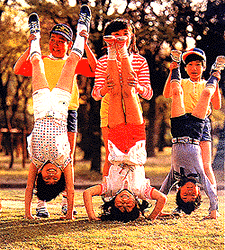
Child Welfare
In modern commercial society many parents are unable to personally care for their own children because of the need to earn a living. In order to insure that the next generation is able to grow up in a safe and caring environment, the government has been promoting childcare services.
The government has adopted the following measures to enhance the availability and quality of childcare services:
Article 5 of the R.O.C.'s Child Welfare Law stipulates that "when the rights of children are unlawfully infringed upon, the government must provide adequate assistance and protection." Specific measures in this regard are as follows:
- In order to insure improvement in terms of both quantity and quality, incentives are being offered for the establishment of new daycare centers, the provision of innovative childcare services, and the installation of ample safety and educational facilities and equipment.
- A professional training program for caregivers and a technical skills assessment scheme for private babysitters have been established. It is hoped thereby to achieve the goal of "using training to upgrade knowledge and skills, and relying on professionalism to enhance quality."
- Preferential free childcare services are being provided to the children of underprivileged and low-income families (fees are half-price for the children of low-income families). In addition, low-income households and foster families may receive up to NT$1,500 per month for every child enrolled at a daycare facility.
- Notification:
In order to uncover cases of children being subjected to abuse or neglect, all counties and cities in Taiwan have established child protection hotlines. When anyone discovers children suffering abuse, neglect, improper or illegal treatment, they should inform the county or city social affairs division (bureau) and seek protection.
- Investigation:
Article 36 of the Child Welfare Law allows personnel in charge of child protection to make an investigation of cases of child abuse and require the cooperation of those being investigated. In order to assist in locating missing children, the Children's Welfare Federation Cultural & Educational Foundation also provides a telephone hotline for information concerning missing children. ((02) 748-6006)
- Protective intervention:
In accordance with regulations contained in Article 15 of the Child Welfare Law, personnel in charge of child protection must immediately dispatch workers to investigate the situation and reach an informed judgement after being informed of a case of child abuse.If social workers have determined that it is safe to allow the child (children) to live at home with his or her parents, they will provide the household with necessary services.
The length of short-term placement in foster care of children whose household is undergoing adjustment will be from a minimum of several months to a maximum of one to two years. During this period the child (children) must be separated from parents, and parents will temporarily lose their parental rights and privileges. The responsibility of caring for the child (children) will pass to a childcare organization.
If social workers determine that parents or guardians are unable or unwilling to provide a child (children) with a safe living environment, the government must locate a permanent foster home for the child (children).
Youth WelfareThe Youth Welfare Law promulgated on January 23, 1989 defines "youths" as those who are 12 years of age or older but not yet 18 years of age. The intent of this law is to promote the welfare of adolescents, foster their sound mental and physical development, and instill a greater sense of responsibility in adolescents' parents and guardians. Relevant welfare measures include employment and educational guidance, assistance for adolescents who lack means of support, and shelter, counselling, placement in foster care, protection, and adoption for adolescents in distress. In order to implement an adequate youth welfare policy, this law also lists special ordinances and penalties insuring protection of youths.
Important Government Measures Relating to Youth Welfare and Protection:
- In order to meet the basic developmental needs of young people, youths from impoverished households are provided with care services.
- In order to foster wholesome mental and physical development, youths in distress or exhibiting deviant behavior are provided with protective services.
Providing Source : Ministry of Interior
File Last Revised : Feb. 8. 1996
Contact Phone : 886-2-3565516






Social Welfare and National Health Insurance Home page

